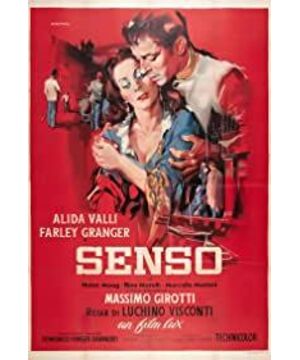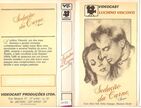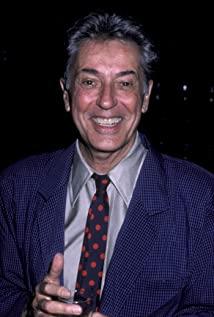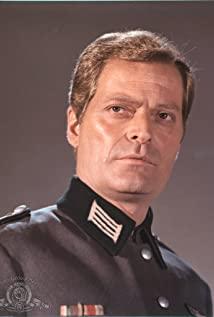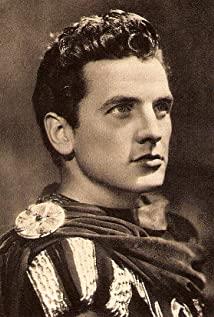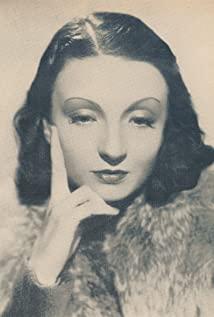The film is based on the novel of the same name by Camilo Boeto. The original novel was written in the first person, expressing the heroine's inner monologue and repentance in the form of a diary. This was originally a pale love story, but Visconti placed it in the social background of the Italian unification movement with delicate techniques, and enriched and developed the content of the story, making it sublime into a dramatic conflict, A spectacular film reflecting the characteristics and social features of a historical period. The film begins with a performance of Verdi's opera "The Bard" at the La Fenice and ends with a long shot of Franz's execution. Visconti chose the four-act opera "The Bard" for his own reasons. Because the opera is also a tragic story. The plot is set in Visca, Spain, and it is a tragedy that intertwines the revenge story of the feudal lord's cruel persecution of the Gypsies in the early 15th century and the love story of the beautiful female officer under the princess and the young bard Manrico. The film is also "four acts", that is, four paragraphs: the theater performance, Livia's rendezvous with Franz; Franz goes to Arderno to meet Livia; Franz is executed. The male protagonist in the film, like Manrico, the character in the play, was eventually executed. But the fate of individuals here is already symbolic: the demise of a decaying society, the end of an era. Therefore, Visconti used the fate of the characters in the opera to herald the end of the film, which is more infectious. French film critic Bazin once said when talking about "Emotions": "Visconti wants to interpret musicals (that is, operas) into real-life stories, and if he thinks so, then he is doing it now. arrive."
Franco Zeffirelli, who was assistant director for Visconti in "Emotions," recalls a day in 1952 when he and Visconti watched "The Bard" at La Scala in Milan: : "In the fourth act, Leonora came on. It was the dead of night, when she stood in front of the prison where her lover Manrico was being held and sang that touching aria. That scene made Visconti Excited. He whispered to me: 'This time I know how to make my film.'"
It can be seen that after filming excellent neo-realism films such as "The Earth is Fluctuating" and "Little Beauty", Visconti began to prepare and film another style of film, which is the kind of film that has both profound cultural connotation and A film with strong artistic appeal. His ideas coincided with the intentions of the producers. As recently as 1952, Giovannielli, the manager of Lux Films, asked him to make a "high-art, entertaining film", to put it bluntly, a film that combined artistic and commercial quality. Savvy filmmakers have noticed that after the climax of neorealism, people are already craving something new.
As always, Visconti did a lot of meticulous preparation before shooting: from choreography to costumes, from dialogue to photography. Interestingly, the dialogue between the two heroines is in English. Because Visconti originally wanted to use American actors Marlon Brando and Ingrid Bergman to play the male and female lead roles, but they were not able to participate in the show for various reasons, so they were replaced by Grange and Wally. But they still had to use English dialogue. Because the English translation of the Italian production department was not ideal, Visconti invited American playwright Tennessee Williams and writer Paul Powers, who were in Rome at the time, to revise and polish the translation. The dialogues are quite different from the original after they have been polished, especially the dialogues between Livia and Franz's night walk and their trysts almost become their "re-creations". Their poetic dialogue adds romance to the film, while also conveying the turbulent psychological and emotional nuances of the two protagonists' initial encounter. Williams was Visconti's favorite writer, and they shared a common artistic taste. Therefore, he liked the dialogue they created. Visconti is good at directing actors to the kind of dialogue that is both decadent and literary. This is Visconti's artistic style.
The filming of the film begins with the war scene. The location chosen by the director is in line with the authenticity of history and is closely related to the story and the fate of the characters. But he had to be cautious about the battle of Kustoza, which ended in an Austrian victory. Because before filming, he was under pressure from politics and the military. They demanded that the film's presentation of the lost Italian battle be consistent with official views, public opinion and textbook references. Visconti shot a lot of war scenes, but in the final edit, in order to highlight the main line of the story and to make the film go smoothly, he deleted many scenes of war. When filming the hero and heroine's play, the director's requirements for photography are also very strict. For example, in the scene where the two people had a tryst in the room, the director asked the photographer to create an atmosphere with light and shadow effects in the room, so that the colors were between reality and fantasy, natural environment and imaginary realms. To this end, the photographer made the lighting of the room orange to achieve a soft and warm effect, which is very harmonious with the inner activities of the characters.
If the film begins with the first act of "The Bard", which expresses the author's homage to the musician he loves, then, in the subsequent plots of the Phoenix Theatre, Visconti uses the Austrian composer An East Bruckner's music, the most used is his Seventh Symphony in E major. This symphony has a strong melodic beauty, a dazzling counterpoint, and a magnificent orchestration, which seems to be the opposite of the style of the film. But Visconti has his own ideas: to use the music of contemporary musicians to express contemporary stories may be more in line with the atmosphere of the times. But more importantly, Visconti believed that Bruckner's music, in its glory, heralded the downfall of Austrian mythology. There is a moral here: although Italy was defeated at Custoza, Garibal’s generals had moved north, and the period of Austrian rule over Italy was coming to an end.
In every sense of the word, this film is a masterpiece, a turning point in Visconti's directorial career. The film participated in the Venice International Film Festival that year, but failed to win (the Golden Lion was awarded to Castellani's "Romeo and Juliet"). This sparked a heated debate between his supporters and opponents. The jury also appeared to be under pressure from the outside; members of the government refused to attend the film's premiere. In Milan, conservative orthodox critics accused his films of undermining the image of Italian musicals, accusing him of subordinating music entirely to the dramatic effects of his films.
Why did his film arouse such strong repercussions and heated debates? This debate involves not only how to evaluate the film "Emotion", but also how to evaluate Visconti's status in the Italian film industry. In fact, this is a battle between defenders and opponents of neorealist cinema. Indeed, there was a crisis in neorealist cinema at the time, and some people thought it was "outdated". Whether it's a fashion comedy film (called "Rose Neorealism" at the time) or an inner neorealist film (like Fellini's "The Road"), whether it's an academic formalist film (like Castellani's) It is in this situation that filmmakers are exploring new paths. It can be said that "Emotion" is a successful form of this new exploration. It is a charismatic, mature film that cannot be classified in the history of Italian cinema in the 1950s. Visconti wisely uses personal tragic stories to metaphorize a decaying and declining society and the end of a historical era, while at the same time making people vaguely see the dawn of a new world and a fairer society. In terms of expressive techniques, he broke through the creative framework of more than ten years and explored a new way. In short, Visconti's "Emotions" shows Italian society with a brand-new dramatic force, and opens up a new way of artistic creation with a narrative style similar to fiction in realism. This style was further developed in his later films "White Nights", "Rocco and His Brothers" and "Death in Venice", forming the style of "Visconti Fiction Films".
View more about Senso reviews


